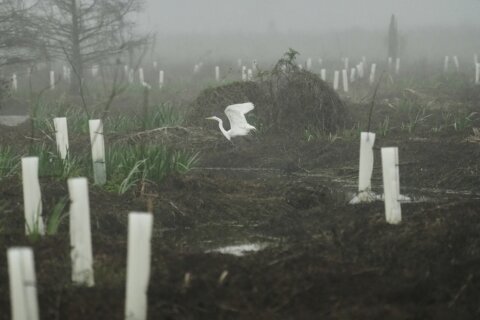You may think that when you’re cuddled up on the couch with a good book and a warm cup of tea, it’s just you and the story’s cast of characters.
But really, thousands are present — in the air, on the walls, even under your armpits.
“Regardless of how you live and how you clean and how you seal yourself in, your house will be full of life,” said Rob Dunn, a biologist and professor in the department of applied ecology at North Carolina State University.
“We’ve never swabbed or poked or investigated a spot in the house that wasn’t covered in living species.”
In his latest book, “Never Home Alone: From Microbes to Millipedes, Camel Crickets, and Honeybees, the Natural History of Where We Live,” Dunn uncovers the biodiversity of indoor spaces — a world more varied than he ever imagined.
“We found more kinds of fungi inside houses than there are named kinds of fungi in North America. Which is just to say that we don’t know that much about fungi, and every time you breathe in, you’re breathing in the unknown,” Dunn said.
And every time you shower, you’re doing so among a myriad of microbes. The proof is in the small buildup of “gunk” inside the shower head.
“It’s a kind of apartment that the microbes poop for themselves so they can stay there even when the water pressure is really high, and they get nutrients out of the water,” said Dunn, who added that the organisms he discovered in this biofilm varied from house to house.
In some cases, Dunn and his team came across nontuberculous mycobacteria — a bacteria that, for the most part, doesn’t cause problems, but can be an issue for those who are immunocompromised. When trying to understand why this bacteria was more common in some homes, compared to others, Dunn found an answer in the water.
“When water systems are heavily chlorinated, the chlorine appears to kill most of the bacteria, but it leaves the things that are tolerant to the chlorine, and that included these nontuberculous mycobacteria,” Dunn said.
“This means that what’s going on in your shower head is actually ecologically really, really complex and probably very different from our intuitive sense of just sterile water pouring down upon us. It’s really a whole forest that’s pouring down upon you, and that’s just the way it’s always going to be.”
And what’s living in your bathroom doesn’t even touch on the spiders, insects and more visible species hanging out in your home. Before embarking on the research, Dunn expected to find a handful of buglike breeds indoors, but instead he counted more than 2,000 species of insects and their relatives.
“It’s a whole zoo that we wake up to every day,” he said.
These numbers may spark shivers, shudders, even screams from some, but an indoor environment rich in life isn’t a bad thing. In fact, it’s good.
“But as we’ve sealed our homes off, a lot of the species that might be most beneficial seem to have been left outdoors, and that includes bacteria species that we seem to need for our immune systems to work well,” said Dunn, who added that a lack of biodiversity in today’s world likely contributes to the rise of allergies, asthma and chronic inflammatory disorders.
“To varying extents, those all seem to relate in part to our immune system basically getting bored and attacking itself or attacking some allergen rather than attacking the things that it should be attacking. And it seems like we actually need an exposure to a diversity of outdoor leaf-and-soil bacteria in order for our immune systems to work properly.”
His advice for those concerned with how to keep a clean and healthy home? Moderation.
Continue to do the things that are effective from a public health standpoint: Wash your hands with soap and water; get vaccinated; and pay attention to how long food stays in the fridge.
“All those things work, they’re incredibly important, they save lots of lives,” Dunn said.
But at the same time, don’t abuse “the things that we use to kill species around us when we don’t really need to” — and that includes antibiotics.
“We’re vastly misusing the tools we have at hand in order to control the microbes around us at the wrong time, so stop doing that,” said Dunn, who also suggested opening the windows, digging in dirt and eating fermented foods — all things that have some or several benefits, and “don’t seem to have costs.”
“Ideally in the future I’d be great if we figured out a way to garden a house full of the most useful species, but we’re a long way away from that. And so I think the short term is at least to not accidentally kill many, many of the most useful species,” Dunn said.
“And remember: We’re part of life, and so when you try to scrub everything out of your home, in some real way you’re scrubbing your own being and life out of your home, too. We depend on the rest of life around us.”







